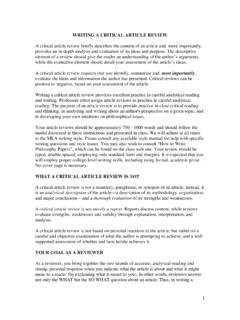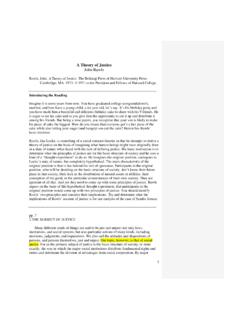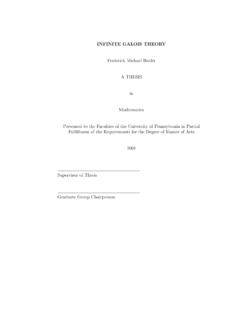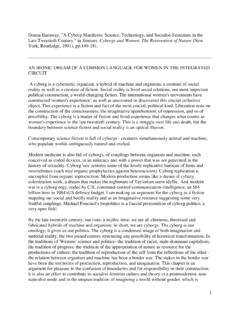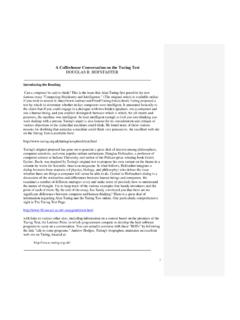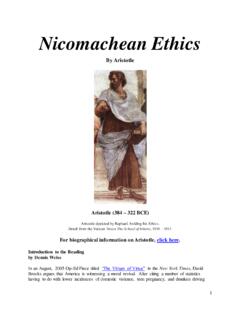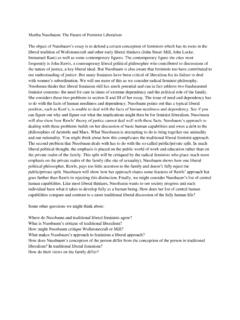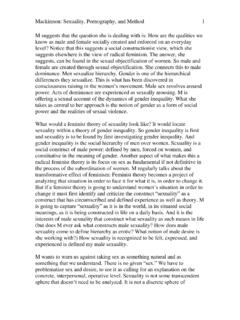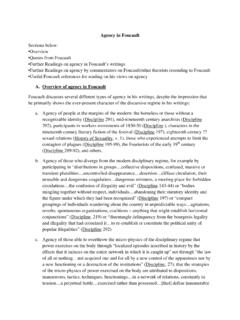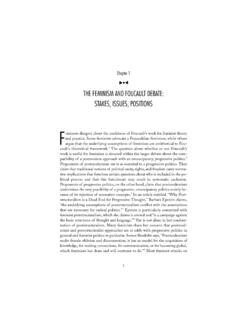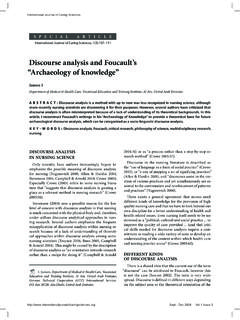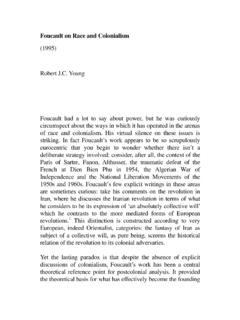Transcription of MICHEL FOUCAULT TWO LECTURES (1976)
1 1 Richard L. W. Clarke LITS3304 Notes 04 AMICHEL FOUCAULT "TWO LECTURES " (1976)"Two LECTURES ." Power / Knowledge: Selected Interviews and Other Writings, 1972-1977. Gordon. Brighton: Harvester, 1980. One, January 7, 1976 While FOUCAULT notes the "increasing vulnerability to criticism of things, institutions, practices,discourses" (80), he is wary of "global, totalitarian theories" (80) which have in fact proved ahindrance to research. Hence, his sense that social criticism over the last few years has beenlocal and less theoretical than reality-oriented. In addition, FOUCAULT argues that we have beenwitness to the "insurrection of subjugated knowledges" (81), that is, of the "historical contentsthat have been buried and disguised in a functional coherence or formal systematisation" (81).
2 By subjugated knowledges, FOUCAULT means those "naive knowledges, located low down on thehierarchy, beneath the required levels of cognition and scientificity" (82). It is through thereappearance of such knowledges that criticism of the sort which he offers performs its is of the view, for example, that it is a semiology of the life of the asylum or a sociology ofdelinquency which would have prevented an effective "criticism" (81) of the asylum of the sortwhich he himself offered in works like Madness and Civilisation. For FOUCAULT , it is as much in the "specialised areas of erudition (83) as in what hecharacterises disqualified, popular knowledge" (83) that there lies the "memory of hostileencounters.
3 Confined to the margins of knowledge" (83). It is precisely such marginalisedmemories that his approach to social criticism, what he came to describe with the Nietzscheanterm genealogy, is concerned to uncover. Genealogy "allows us to establish a historicalknowledge of struggles and to make use of this knowledge tactically today" (83) by entertainingthe claims of illegitimate knowledges versus the claims of that"unitary body of theory whichwould filter, hierarchise and order them in the name of some true knowledge and some arbitraryidea of what constitutes a science and its objects" (83). There is no question here, however, ofa naive return to "direct cognition" (84) or "immediate experience" (84).
4 There is, rather, aconcern with the insurrection of knowledges opposed to the "effects of the centralising powerswhich are linked to the institution and functioning of an organised scientific discourse within asociety such as ours" (84). Genealogy reactivates local knowledges against the scientifichierarchisation of knowledges and the effects intrinsic to their power" (85). Where the activitywhich he terms archaeology (and to which most of his early works were devoted) refers to the"methodology of this analysis of local discursivities" (85) (that is, the analysis of the particulardiscourses which constitute the human sciences such as psychiatry), genealogy refers to the"tactics whereby, on the basis of the descriptions of these local discursivities" (85), suchsubjected knowledges could be located in opposition to the forces of centralisation andhierarchisation.
5 FOUCAULT 's objection against Marxism is located precisely in the claim to make a scienceout of it. For FOUCAULT , it is vital to "question ourselves about our aspirations to the kind ofpower that is presumed to accompany such a science" (84). He asks:What types of knowledge do you want to disqualify.. Which speaking,discoursing subjects which subjects of experience and knowledge do you thenwant to diminish? .. Which theoretical-political avant-garde do you want toenthrone in order to isolate it from all the discontinuous forms of knowledge thatcirculate about it? (85)Moreover, FOUCAULT 's concern is that once hitherto unvalorised knowledges are brought to lightand put into circulation, they "run the risk of re-codification, re-colonisation" (86), annexed andtaken back into the fold, as it were.
6 Indeed, he warns that the silence with which unitary,2 Richard L. W. Clarke LITS3304 Notes 04 Ascientific theories confront the genealogy of knowledges which FOUCAULT is desirous ofundertaking is no indication of fear on their part, indeed, it could be the "index of our failure toproduce any such fear at all" (87). The reason for this fearlessness, and the object with which all genealogies must ultimatelycome face to face, is that "power which has surged into view in all its violence, aggression andabsurdity" (87) in recent years. FOUCAULT is at pains to discover the nature of this power whileavoiding what he terms the "theoretical coronation of the whole" (88) or scientification whichhe has already warned about:what are these various contrivances of power, whose operations extend to such differinglevels and sectors of society and are possessed of such manifold ramifications?
7 What aretheir mechanisms, their effects and their relations? (88)The key question for FOUCAULT in this regard is simply this: is the analysis of power or of powersto be deduced in some way from the economy, a way of thinking about power most commonlyassociated with Marxism per se. FOUCAULT contends that though it is not immediately apparent, both Marxist and non-Marxist (liberal) theories of power are guilty of a certain "economism" (88) in theirconceptualisation of power. In the case of what he terms the classic, juridical theory of power (88) (the political philosophy normally called liberalism ), it is viewed as aright, which is one is able to possess like a commodity, and which one can inconsequence transfer or alienate, either wholly or partially, through a legal act orthrough some act that establishes a right, such as takes place through cession orcontract.
8 Power is that concrete power which every individual holds, and whosepartial or total cession enables political power or sovereignty to be theoretical construction is based on the idea that the constitution of politicalpower obeys the model of a legal transaction involving a contractual type ofexchange, hence the clear analogy that runs through all these theories betweenpower and commodities, power and wealth. (88), In this schema, political power (89) is predicated on the process of exchange, the economiccirculation of commodities (89). FOUCAULT is alluding in all this, of course, to the foundationalrole played by Rousseau s The Social Contract in the development of liberalism and continuedin the work of recent Anglo-American philosophers like John Rawls.
9 For FOUCAULT , Marxistsconceive of power "primarily in terms of the role it plays in the maintenance simultaneously ofthe relations of production and of a class domination which the development and specific formsof the forces of production have rendered possible" (88-89). Political power, in short, ispossessed by the wealthiest sectors of a society and is used to maintain the status quo. FOUCAULT 's admits that "power is profoundly enmeshed in and with economic relations"(89). However, he wonders whether, contrary to the view of Marxists, power is always in a subordinate position relative to the economy? Is it alwaysin the service of, and ultimately answerable to, the economy?
10 Is its essential endand purpose to serve the economy? Is it destined to realise, consolidate, maintainand reproduce the relations appropriate to the economy and essential to itsfunctioning? (89)On the other hand, he wonders, alluding to liberalism, whether power is best conceptualised asa kind of commodity that exchanged between persons. He concludes that neither the model of"functional subordination" (89) ( Marxism) nor "formal isomorphism" (89) ( liberalism)accurately characterise the interconnection between politics and the economy (89), the indissolubility (89) of which is of an entirely different order (89).

